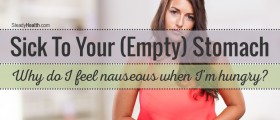
Vomiting also known as emesis can be defined as forceful expulsion of the stomach's content through the mouth. If it is severe enough the stomach's content can be even ejected through the nose. This is a reaction which commonly accompanies many medical conditions and it can be also associated with intake of certain medications. Vomiting is considered physiologic in the first trimester of the pregnancy. In a majority of cases vomiting is preceded by nausea. Still in some people vomiting is not accompanied by nausea (increase in intracranial pressure, pyloric stenosis etc.).
Causes of Vomiting after Eating
In majority of cases vomiting after eating is associated with improper eating habits. People who tend to overeat as well as those who have not eaten for a long period of time may experience vomiting after food consumption. Even particular foods may cause vomiting. This especially refers to heavy fatty meals. Vomiting more frequently occurs if one eats late at night and eats hastily or gulps food.
The very quality of the food is another potential cause of vomiting after eating. Namely, certain ingredients or specific foods may not suit the person's body and simply cannot be accepted by the digestive system. These foods are easily ejected from the body. Furthermore, vomiting after eating can be a consequence of food poisoning. And even if one is suffering from food intolerance or is allergic to certain food he/ she may experience vomiting after eating the particular food.
Vomiting can be a symptom of some medical conditions such as motion sickness, sea sickness, indigestion etc. Even more serious medical conditions such as high altitude sickness, intestinal obstruction, appendicitis, gallbladder disease, brain tumors, meningitis, migraines etc are typically accompanied by vomiting after eating.
Vomiting after eating can be a side effect of certain medications (chemotherapeutics) and it can be also associated with exposure to chemicals and toxins.
In pregnancy vomiting typically occurs in the first trimester and is generally induced by certain smells and odors. It can be a symptom of certain eating disorders such as bulimia. And finally, excessive intake of alcohol beverages is always accompanied by vomiting.
How to Prevent and Cure Vomiting after Eating
In some cases vomiting after eating can be prevented. This particularly refers to people who have to deal with this problem due to food intolerance and food allergies. By avoiding the problematic food one can successfully avoid vomiting. Furthermore, the symptom usually withdraws once the underlying condition is brought under control. People suffering from eating disorders require special care and medical attention such as psychologists or psychiatrists. And finally, those who who are prone to vomiting due to unhealthy eating habits can successfully avoid this unpleasant act by simple dietary changes.

















Your thoughts on this
Loading...